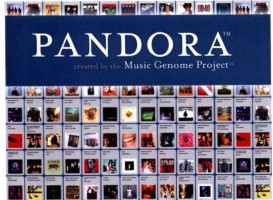
The Issue
Pandora is attempting to reduce the royalty rate they—by law—must pay the artists whose music they stream. Pandora states that they need this rate lowered in order to remain competitive. Of course, artists, and those who collect on their behalf (for example, SoundExchange) oppose such a reduction.
So, what is going on here?
To answer that question, we need to lay out some framework with respect to precisely what it is that Pandora is doing, and how what they do affects artists.
1. The Principles
Pandora must pay the artists when their music is streamed.
The first thing to understand is that Pandora, and any other broadcaster of music, must, by law, pay the artists whose music they broadcast. This is because the law grants exclusive rights to artists when they create a song.
Before addressing which rights are involved here, it’s important to realize that there are typically two copyrights at play when a song is broadcast. The first is the copyright that is controlled by the person who wrote the song. This copyright is for the composition itself—the music and the melody. It is denoted by a (c).
The second copyright is controlled by the owner of the master recording of the song—the version of the song as reproduced on a CD, vinyl, download, etc. This copyright, typically held by a label, unless the artist is his/her own label, and thus held by the artist—is denoted by a (p).
Therefore, when a song is played over Pandora, or any other public broadcaster—be it another streaming service like Spotify, a terrestrial (traditional) radio station, a web radio station, or a TV network—two copyrights are at play: the copyright to the composition (the (c)), and the copyright to the sound recording (the (p)).
2. The Rights
As stated above, the law grants certain rights to these copyright holders.
The two relevant rights here are:
1. The exclusive right of public performance.
2. The exclusive right of public performance in the sound recording via digital transmission.
The key word to focus on is “exclusive.” What this means is that only the copyright holder has the right to publicly perform (i.e. broadcast) his/her music, and should anyone else do so without the copyright holder’s approval, they would be infringing upon the copyright holder’s exclusive rights.
How, therefore, does Pandora, or any other broadcaster, avoid infringing upon an artist’s exclusive rights when they play/stream the artist’s music? Certainly, it would be impossible for the broadcaster to negotiate a deal with every artist they play/stream. However, if some sort of deal is not in place, these broadcasters are infringing upon the copyright holders’ exclusive copyrights.
3. The PROs
A system was developed to make it possible for those who desired to broadcast copyrighted music to be able to do so, while avoiding the frequent infringements that would occur absent an agreement with the rights’ holders. The system involves Performance Rights Organizations (PROs), so-called clearing houses. In the U.S. there are four dominant clearing house organizations. Three of these collect on behalf of the copyright holder in the composition (the (c)): ASCAP, BMI, and SESAC. One collects on behalf of the copyright holder in the sound recording (the (P)), but only when the sound recording is publicly performed via non-interactive digital transmission (e.g. on a service like Pandora, or web radio, or satellite radio):SoundExchange.
These clearing house agencies act on behalf of the copyright holders. In the case of ASCAP, BMI, and SESAC (i.e. those who represent the copyright holder in the composition), the copyright holder must affiliate with them. By doing this, they are granting these agencies the rights to negotiate on their behalf with the broadcasters. Additionally, the copyright holder grants them the right to collect fees from these broadcasters on their behalf.
In the case of SoundExchange—who, remember, only acts as a clearing house on behalf of copyright holders in the sound recording (the (p))—they collect on behalf of all master holders, whether the master holder has affiliated with SoundExchange or not.
All of these broadcasters pay a blanket license fee to the clearing house agencies in exchange for the right to publicly perform the copyright holders’ work, and avoid issues around infringement.
These clearing house agencies then determine the amount owed to the respective copyright holders, and pay out based on formulas that take into consideration things like frequency of broadcast, type of broadcast (as background music to a TV show, a low-power radio station, etc.). The formulas are complicated, but, in general, the more your music is publicly performed, and the more people who hear it when it is publicly performed, the higher the payout.
Exactly how much is paid out, and who determines the amount sets the stage for our next article, and allows us to finally introduce the issues surrounding Pandora…
George Howard, COO of Concert Vault, Daytrotter and Paste Magazine, is a frequent contributor to the TuneCore Blog. This article is republished here by permission of the author and TuneCore.